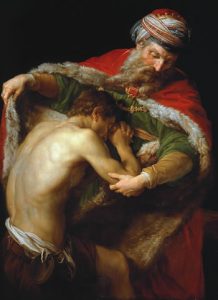The Problem of Sin and God
Is sin a problem for God?
NO!
No, sin is not a problem to God in the sense that He cannot cope with it, cannot overcome the difficulty that sin presents – not to Him but to us, the ones who sin.
Even the Old Testament recognised that God could and did deal very effectively with sin – if the one affected by sin turned to Him in sorrow. The prophet Micah expresses this so well, with vivid imagery:
What God can compare with you, for pardoning guilt and for overlooking crime?
He does not harbour anger for ever
since He delights in showing faithful love.
Once more have pity on us;
tread down our faults;
throw all our sins to the bottom of the sea.
Grant Jacob your faithfulness,
And Abraham your faithful love.
Micah 7:18-20
When King David is brought to realise his great sin, in having Uriah killed in battle, he offers no excuses, no explanation to Nathan the prophet. David’s response is simply:
I have sinned against Yahweh.
And God? His response through Nathan was:
Yahweh, for His part forgives your sin; you are not to die.
(2 Samuel 12:5-14)
God, it seems, is so ready to forgive, so eager to forgive.
And so, when God became man in Jesus, we find the same readiness, the same eagerness, in the words and action of Jesus. Let us look at a couple of examples.
In the parable of the Pharisee and the tax-collector, it is the tax-collector who seeks God’s mercy that Jesus says goes home justified; not the Pharisee who could not even see any need for God’s mercy (Luke 18:9-14).
And what an image for God in His love, mercy and eagerness to forgive do we have from Jesus in His story of the father with two sons; the ‘prodigal’ who returns to his father:
I have sinned against heaven (God) and against you.
And the elder son who is unwilling to go in and join his father in celebrating the return of his brother.
You did notice, of course, that in this marvellous story, the father goes out to both his sons. And the words he says to the elder:
My son, you are with me always and all I have is yours.
(Luke 15:30)
Jesus in His own words and actions showed forth the very eagerness, the desire of God to grant forgiveness. He said to Philip at the last supper:
Philip, to see me is to see the Father.
So, let us see God in action in Jesus showing and granting mercy on two occasions.
The first one is when Jesus enters Jericho. Zacchaeus is one who wants to see Jesus, but being quite short he climbs a tree so that he can. Jesus surprises him by looking up and then inviting Himself to Zacchaeus’ house (Luke 19:1-10).
We are not told what was prompting him to see Jesus. Luke does tell us that he was a senior tax-collector and a wealthy man. Probably many of his dealings and probably his collecting of taxes were not so honest. The people said,
He (Jesus) has gone to stay at a sinner’s house.
Zacchaeus does not declare himself a sinner or explicitly ask for mercy but he does say that he intends to give half his property to the poor,
And if he has cheated anybody he will pay him back four times the amount.
A penitent’s response, surely! A readiness for mercy.
And Jesus, what does he say?
Today Salvation has come to this house -- for the Son of Man has come to seek out and to save what was lost.
(Luke 19:1-10)
Perhaps the most wondrous ‘vision’ of mercy that God grants and which He seeks ever to bestow on us poor sinners is in that encounter between Jesus on the cross and the one also crucified whom we call the ‘good thief’.
That man clearly and openly acknowledges that he has sinned, though not using the word sin. He says to the other criminal:
You got the same sentence as he did, but in our case, we deserved it. We are paying for what we did. But this man has done nothing wrong.
Then he speaks to Jesus. He makes just one very simple request:
Jesus, remember me
. . . Just one extraordinary request:
Jesus, remember me when you come into your kingdom.
We are given no clue as to why the ‘good’ thief associates Jesus, the one crucified with him, with a kingdom – other than the inscription above Jesus on the cross:
The King of the Jews
But his simple request is that Jesus remember him (a criminal, a sinner) when he comes into His kingdom.
And what is Jesus’ response? Just as extraordinary, just as simple:
In truth, I tell you, today you will be with me in paradise.
A reply so simple; so overwhelming. The crucified Jesus responding to the crucified thief! Here we see mercy as it is in the heart of God in His ever-readiness, His eagerness with its immediacy.
Can anyone doubt that God is there with his mercy for anyone who realises he /she needs and seeks forgiveness and mercy?
In the Revelations of Divine Love of Julian of Norwich we find words that are like a commentary on the above:
Nothing is more impossible than that we should seek mercy and grace and not have it.
If we sometimes take up the Gloria of the Mass for our own prayer we could add another word of praise:
We praise and thank you for the wonders of your great mercy.



 Entries(RSS)
Entries(RSS)